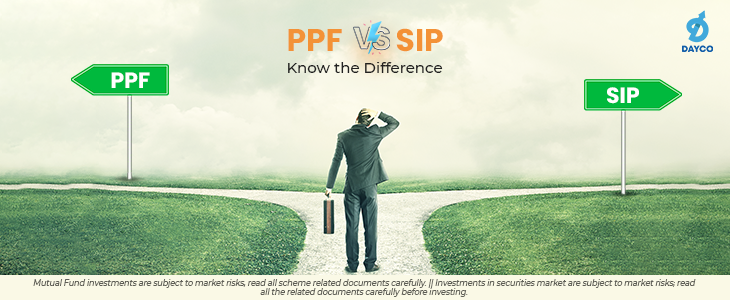SIP (Systematic Investment Plan) and PPF (Public Provident Fund) are both very common financial instruments in India that serve different purposes and accommodate different investment needs. While talking about SIP vs PPF returns, it is important to keep the risk appetite, the time frame and the goals of investors in mind.
Here’s a comparison of SIP and PPF and why both are important and should not be ignored:
SIP (Systematic Investment Plan):
SIP is a mode of investing in mutual funds where one can invest a fixed (pre-determined) amount regularly (monthly) over a period of time. Through SIP an individual can invest in a diversified portfolio of stocks, bonds, or other securities, depending on the particular mutual fund’s scheme.
Advantages of SIP:
- Flexibility: One can start with a small amount and gradually over the period of time there is an option of increasing the regular contribution towards the investment.
- Diversification: SIP invests in a variety of assets, thereby considerably reducing the risk connected with investing in individual stocks.
- Professional Management: the mutual fund schemes of each mutual fund house are managed by professional fund managers who aim to generate healthy compounding returns over the long-term period.
- Liquidity: one can redeem their mutual fund units at any time, giving the option of liquidity whenever required.
- Potential for Higher Returns: equity-based mutual fund’s scheme has the potential to generate higher returns over the long term compared to traditional fixed-income instruments.
PPF (Public Provident Fund):
PPF is a long-term, government-backed savings scheme in India. It offers attractive Tax benefits and a fixed interest rate, the maturity period is after 15 years, which can be extended in blocks of 5 years as long as one desires to contribute towards the account.
Advantages of PPF:
- Tax Benefits: PPF investments are eligible for tax deductions under Section 80C of the Income Tax Act.
- Guaranteed Returns: The government sets the PPF interest rate, and it is typically higher than most fixed deposit rates, providing stable and secure returns.
- EEE Tax Status: PPF offers tax exemption on investment (up to 1.5lakh annually), interest earned, and maturity proceeds, making it an attractive tax-saving option.
- Safety: PPF is a government-backed scheme that ensures the highest level of safety for their investment.
Should You Invest In PPF or SIP?
PPF and SIP – both are actually important. You can’t choose one over another. Here’s why –
- Diversification: Diversification is a fundamental principle of investing. SIP invests in a diversified portfolio of mutual funds, which can include equity, debt, and hybrid funds. On the other hand, PPF provides a stable and secure fixed-income avenue. By having both, an individual can spread their investment across different asset classes, reducing the overall risk.
- Short-term and Long-term Goals: SIP is suitable for long-term wealth creation and goals like Retirement, Daughter’s Marriage, etc while PPF is an excellent choice for long-term savings with specific goals like children’s higher education. Having both provides an added benefit to meet both short-term and long-term financial goals.
- Tax Planning: By investing in both SIP and PPF, one can optimise tax planning. SIP investments in ELSS (Equity Linked Saving Scheme) funds can help you claim deductions under Section 80C (under old Regime), while PPF offers EEE tax benefits, which means your investment, interest earned, and maturity proceeds are all tax-free.
- Flexibility and Liquidity: While PPF has a long lock-in period, SIP provides liquidity and flexibility, allowing access to your money whenever needed (online).
Having both ensures a balance between accessibility of funds and with a long-term growth perspective.
In conclusion, SIP and PPF are both important and useful financial instruments, each with its own set of benefits. Depending on your Financial Goals, Risk Tolerance (Risk Profile), and Investment Horizon (Investment Time-line), one should include both these Investment avenues in the investment portfolio to enjoy Diversification, Tax benefits (Sec 80C), and a stable approach towards Wealth Creation and Financial Independence.
As with any investment decision, it’s essential to consult with a financial advisor to create a strategy and an individually tailored investment approach to one’s specific needs.
If you have a question, share it in the comments below or DM us or call us – +91 9051052222. We’ll be happy to answer it.
–Avishek Pyne
















